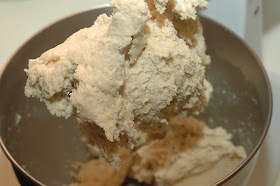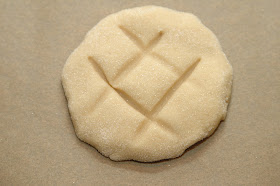There is hardly a month that goes by that someone doesn’t
reminisce about the bakery to me.
It’s hard to believe that Latshaw’s Bakery has been closed for more than
35 years. It was started by my
great-grandfather Hosea in 1882 and my dad was the third generation baker.
 |
| Latshaw's Bakery, circa 1965 The 1961 Chevy station wagon in which I learned to drive is in the driveway. |
Everyone who misses the bakery usually misses a particular
item that was sold there. For some
it is the cinnamon buns. Others
miss the cream puffs and éclairs.
For many it’s the pound cake.
However, more than any other single item, people mention a craving for the
Log Cabin Cookies.
Log Cabins were serious cookies. They were huge; 3½” to 4” in diameter. Log Cabins were thick, not too sweet,
and really a little dry, but I think that was why people liked them. They were great for dunking. Coffee, tea, or milk…it didn’t matter. And when dunked, they didn’t fall
apart.
We have the original Log Cabin recipe. We’ve had it for years. It’s been published in countless church
cookbooks and it’s always passed along to anyone who asks for it. However, I’ve never heard of anyone actually
making the cookies. It probably
has to do with the fact that the recipe calls for 3 lbs. of sugar and 6 lbs. of
flour. (That’s pounds not cups!) In fact, the recipe that we’ve
distributed has a disclaimer at the bottom: “We have no idea how many this makes!”
Here are the ingredients from the original recipe:
3 lbs. sugar
1-1/2 lbs. shortening
10 eggs
5 yolks
1 qt. milk
4 oz. baking soda
6 lbs. flour
Cinnamon
Cloves with spices & lemon flavor
This year, I set about converting the recipe from mostly
weight measurements to cups or teaspoons.
Obviously, I knew it would also be necessary to reduce the recipe down to
a manageable size. Most home bakers
don’t have floor mixers with the same gear box that Mack Trucks use. (It’s true. The bakery’s mixer had a Mack transmission…just no reverse!)
I knew I was on a difficult mission. Recipes for baking are not always
easily decreased successfully…or increased successfully, for that matter. My first step was to find an online
conversion website. I found a
great one! Not only does it
convert weights and measures, it also converts just about anything else you can
think of…clothing sizes, currency, even astronomical units. The site is www.onlineconversion.com. (Of course.)
I converted everything to cups or teaspoons. Then I divided by 10. The resulting quantities of the
ingredients didn’t seem like enough, so I decided to divide by 8. Did you know
that there are 27.4 cups in 6 lbs. of flour? Divide by 8 and get 3.425. I rounded to 3½ cups.
What’s another .075 cup of flour?
Here is my converted recipe.
Ingredients:
1 cup sugar
6 Tablespoons shortening
2 eggs
¼ cup milk
3½ teaspoons baking soda
3½ cups flour
½ teaspoon ground cinnamon
1/8 teaspoon ground cloves
½ teaspoon lemon extract
Directions:
Preheat oven to 350°.
Cream the sugar and shortening. Next add the eggs, milk, spices, and lemon extract, blending
until relatively smooth. Add the
baking soda and mix for about a minute.
Finally add the flour gradually.
I’m glad I didn’t divide the original recipe by four. It probably would have burned out my
Kitchen Aid mixer. The dough
produced by this recipe is very thick and the mixer was “groaning” when the
final ½ cup of flour was added. As long as you’ve added the flour gradually, it doesn’t need to knead for very long!
I honestly do not remember Dad adding any spices or
flavoring to his Log Cabins and the quantities are not specified in the original
recipe. So, I made the first
attempt without any just to see what the base taste would be. The first batch smelled like Log Cabins
while they were baking, looked like Log Cabins when they came out of the oven, and
had the texture and consistency of Log Cabins. But the taste was “off” just slightly. They were pretty bland. For the second batch, I added ½ teaspoon of ground cinnamon, 1/8 teaspoon of ground cloves, and about
a ½ teaspoon of lemon extract. The spices brought the taste right back to the way I remember. When I make the next batch, I'm going to try to kick up the cinnamon a little and ease back on the ground cloves.
I remember a full sheet pan filled with granulated sugar at
the bakery that was used almost exclusively for coating the tops of the Log
Cabin cookies. After dipping in
sugar, the unbaked cookies were placed on large sheet pans lined with parchment
paper. That helped them to bake evenly
and the cookies never stuck to pans lined with parchment.
Bake cookies at 350° for 10-12 minutes, until the edges just
begin to turn brown. Be careful
not to over-bake. This is not a
real sweet cookie. I wasn’t sure
if my converted recipe was just “off” a little, or if Log Cabins came from a
time before so much sugar and other sweeteners were used.
Oh, and I now know how many cookies the original recipe
made. This one-eighth recipe made
18 large (3½”-4”) cookies. That
means the original recipe made 12 dozen!
With that many cookies, you could build
a log cabin!






No comments:
Post a Comment